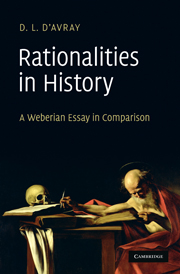Book contents
- Frontmatter
- Contents
- Preface and acknowledgements
- Introduction
- 1 Universal and specific rationalities: theories
- 2 The structure of values and convictions
- 3 Dynamics of values and convictions
- 4 The instrumental–conviction rationality interface
- 5 Formal rationality
- 6 The formal–substantive interface
- Conclusions
- Appendix: rationalities in a case before the Congregation of the Council
- Bibliography
- Index
3 - Dynamics of values and convictions
Published online by Cambridge University Press: 05 June 2012
- Frontmatter
- Contents
- Preface and acknowledgements
- Introduction
- 1 Universal and specific rationalities: theories
- 2 The structure of values and convictions
- 3 Dynamics of values and convictions
- 4 The instrumental–conviction rationality interface
- 5 Formal rationality
- 6 The formal–substantive interface
- Conclusions
- Appendix: rationalities in a case before the Congregation of the Council
- Bibliography
- Index
Summary
In the previous chapter it was argued that conviction rationalities have an intrinsic durability and tenacity, arising, first, from the logical and psychological support that the various elements of a value system provide for the others. Rational people do not easily allow themselves to be persuaded by other views when it comes to fundamentals. Frequently their views are fixed. Paradoxically, it is often rational for them to be unmoved by individual objections. For the convictions of such a person are interdependent. They form a coherent system. Each part supports the others. The motivation to abandon the whole framework of a person's mental world is understandably weak, and may not be even rational. It goes beyond sawing off the branch one is sitting on: it is to try to uproot the whole tree. Secondly, the abstract framework of conviction is embodied in concrete experiences direct or vicarious, or in strong mental images. The force that this kind of concrete thinking exerts on the mind (and on the emotions) increases the reluctance to change. When all this comes together one may usefully speak of a conviction rationality. This combination gave the Azande immunity from empirical evidence against their poison oracles, and it gave Hume immunity from empirical evidence in favour of any miracle.
Functionalism and the durability of values
This Weberian approach should be clearly distinguished from ‘functionalism’, ultimately compatible though these two approaches are.
Information
- Type
- Chapter
- Information
- Rationalities in HistoryA Weberian Essay in Comparison, pp. 94 - 111Publisher: Cambridge University PressPrint publication year: 2010
